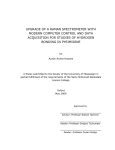Download 0341 Micro-cell Electron Capture Detector (u-ECD)
Transcript
341 Micro-cell Electron Capture Detector (µ-ECD) Theory of operation The Micro-cell Electron Capture Detector (µ-ECD), G2397A, is based on the phenomenon that electronegative species can react with thermal electrons present to form negatively charged ions. The loss of such electrons is related to the quantity of analyte in the sample. In order to produce capturable (low energy) thermal electrons, the carrier gas is ionized by beta particles from a radioactive source in the cell. This electron flow produces a current, which is collected and measured. When the sample molecule is introduced into the cell, electrons which would otherwise be captured at the electrode are captured by the sample, resulting in decreased current. This change is recorded and measured for the chromatogram. Pneumatic lines Vent line Detector body (under cover) Electrometer Heater/sensor cable Electrometer ribbon cable Figure 341-1 Jun 2001 The Micro-cell Electron Capture Detector (µ-ECD) Detectors Agilent 6890 Gas Chromatograph Service Manual 1 of 26 341 Micro-cell Electron Capture Detector (µ-ECD) Theory of operation EPC detector The EPC version of the µ-ECD detector has one flow line for the anode purge/ makeup gas. After an initial filter frit, the line has a proportional valve controlled by a pressure sensor. The line splits into two paths, each containing a non-adjustable restrictor frit. The makeup gas line sweeps past the end of the column and carries the column effluent into the ECD micro-cell. The anode purge flow sweeps the upper part of the µ-ECD and cleans sample deposition from the detector. Filter frit Pressure control loop Proportional valve PS Pressure sensor Anode gas restrictor Makeup gas restrictor Capillary adapter Column Figure 341-2 2 of 26 EPC µ-ECD flow diagram Detectors Agilent 6890 Gas Chromatograph Service Manual Jun 2001 Micro-cell Electron Capture Detector (µ-ECD) Replacement procedures 341 Replacement procedures Replacing the entire detector/detector cell WARNING Before proceeding, turn off the oven and any heated zones and let them cool. Turn off any detector gases at their supply, then turn off the main power switch and unplug the power cord. WARNING The ECD micro-cell contains radioactive 63Ni. To reduce the risk of exposure, wear disposable gloves while handling the ECD micro-cell. When you are finished, dispose of the gloves and wash your hands with soap and water. 1. Caution Jun 2001 Remove the detector cover, the electronics carrier cover and the right side cover. Make sure you are properly grounded with an ESD strap before continuing. 2. Disconnect the electrometer ribbon cable from the µ-ECD interface card. 3. Disconnect the heater/sensor leads from the connector on the right side of the GC. Detectors Agilent 6890 Gas Chromatograph Service Manual 3 of 26 341 Micro-cell Electron Capture Detector (µ-ECD) Replacement procedures Heater/sensor cable Ribbon cable connector Figure 341-3 4 of 26 Disconnecting the µ-ECD cables 4. Inside the oven, remove the insulation cup and disconnect the column from the makeup gas adapter. 5. Use a 9/16-inch wrench to loosen the 1/4-inch Swagelok nut on the makeup gas adapter from the bottom of the detector. Slide the makeup gas adapter out of the bottom of the detector. Detectors Agilent 6890 Gas Chromatograph Service Manual Jun 2001 Micro-cell Electron Capture Detector (µ-ECD) Replacement procedures 341 Unscrew Swagelok nut Figure 341-4 Jun 2001 Disconnecting the make–up gas adapter 6. Disconnect the µ-ECD vent tube at the rubber sleeve. 7. Remove the Torx screw holding the gang fitting onto the detector manifold, and remove the gang fitting. 8. Remove the one Torx T-20 screw securing the top µ-ECD detector cover to the detector pallet and remove the cover. 9. Disconnect the anode signal wire from the detector. Detectors Agilent 6890 Gas Chromatograph Service Manual 5 of 26 341 Micro-cell Electron Capture Detector (µ-ECD) Replacement procedures Anode purge line Makeup gas line Detector top cover Remove µ-ECD vent tube Remove anode signal wire Figure 341-5 Removing the cover, anode purge fitting, vent tube, and anode signal wire 10. Fully loosen the four Torx T-20 screws on the detector pallet and lift the pallet and detector from the GC. 11. Thread the heater/sensor leads out of the detector pallet and remove the detector from the pallet. The µ-ECD detector is now properly disassembled for replacement or exchange. DO NOT remove the inner thermal cover if you are replacing the entire detector assembly. Replacing the heater/sensor assembly After removing the µ-ECD detector from the GC, you can further disassemble it to replace the heater/sensor assembly. 6 of 26 Detectors Agilent 6890 Gas Chromatograph Service Manual Jun 2001 Micro-cell Electron Capture Detector (µ-ECD) Replacement procedures WARNING The ECD micro-cell contains radioactive 63Ni. To reduce the risk of exposure, wear disposable gloves while handling the ECD micro-cell. When you are finished, dispose of the gloves and wash your hands with soap and water. 1. Remove the detector as described in the Replacing the entire detector/ detector cell procedure in this section. 2. Loosen the locking tab screw on top of the detector, slide the locking tab back, and pivot it out of the away. Figure 341-6 3. Jun 2001 341 Unlocking the thermal cover Lift the thermal cover up and carefully slide it off of the anode assembly. Detectors Agilent 6890 Gas Chromatograph Service Manual 7 of 26 341 Micro-cell Electron Capture Detector (µ-ECD) Replacement procedures Heater/sensor assembly Heater blocks Figure 341-7 8 of 26 Removing the heater/sensor 4. Remove the two screws holding the upper heated block onto the assembly. Carefully lift the block over the anode lead and remove. 5. Slide the heater and sensor out of the lower heated block. Detectors Agilent 6890 Gas Chromatograph Service Manual Jun 2001 Micro-cell Electron Capture Detector (µ-ECD) Replacement procedures 341 Replacing the makeup gas adapter After removing the µ-ECD detector from the GC, you can further disassemble it to replace the makeup gas adapter. The makeup gas adapter consists of a line from the detector pneumatics manifold that carries makeup gas to a weldment that screws into the bottom of the µ-ECD detector. From there, the makeup gas sweeps past the end of the column and carries the column effluent into the µ-ECD cell. Note Jun 2001 1. Remove the detector as described in the Replacing the entire detector/ detector cell procedure in this section. 2. Remove the Torx T-20 screw holding the pneumatics block(s) to the detector manifold. There are two pneumatics blocks on the EPC version of the µ-ECD pneumatics manifold. The outside block is the anode purge gas line and the inside block is the make-up gas line. 3. Slide the makeup gas adapter up and out of the GC. 4. When re-installing the makeup gas adapter, ensure the following: • Approximately 6 inches of the makeup gas line resides in the oven after installation. • The makeup gas line is bent into a coil or loop (inside the oven) that loops around the bottom of the detector weldment and makeup gas adapter. Detectors Agilent 6890 Gas Chromatograph Service Manual 9 of 26 Micro-cell Electron Capture Detector (µ-ECD) Replacement procedures 341 Column does not protrude Makeup gas adapter 70 to 72 mm Column nut Column Microbore Column NEED GRAPHIC Figure 341-8 10 of 26 Coil loops around bottom of detector and makeup gas adapter connection. Proper configuration of the column and makeup gas tubing Detectors Agilent 6890 Gas Chromatograph Service Manual Jun 2001 Micro-cell Electron Capture Detector (µ-ECD) Replacement procedures • 341 The end of the column does not protrude from the top of the makeup gas adapter. For most columns (outer diameter > 0.15 mm), insert the column as far as it will go into the gigabore liner. If using a microbore column that passes completely through the liner, position the column so that the total length from the back of the capillary nut to the end of the column is about 70 to 72 mm. Removing an EPC flow manifold Early models of the 6890 GC used Type 1 EPC flow manifolds. Later models use Type 2 manifolds. Both types are covered here. The µ-ECD detector EPC flow manifold contains one inlet supply fitting for a purge/make-up gas. WARNING Caution Before proceeding, turn off the oven and any heated zones and let them cool down. Turn off any detector gases at their supply, then turn off the main power switch and unplug the power cord. 1. Remove the top plastic covers from the detector and pneumatics areas. Also remove the RFI metal shield and the top rear metal cover. 2. Remove the gas supply fitting from the side (Type 1) or rear (Type 2) of the manifold. 3. At the front of the manifold, remove the Torx T-20 screw that holds the manifold in its slot. 4. Disengage the detector tubing from the slots in the chassis so that the gang fitting on the manifold can be removed easily. Make sure you are properly grounded with an ESD strap before continuing. 5. Jun 2001 Unlock the detector manifold’s ribbon cable from the EPC board and detach the connector. The adjacent ribbon cable may have to be removed as well. Detectors Agilent 6890 Gas Chromatograph Service Manual 11 of 26 341 Micro-cell Electron Capture Detector (µ-ECD) Replacement procedures 6. Caution Always hold the Type 2 manifold by its support bracket to avoid damaging board components. 7. Note Remove the Torx T-20 screw holding the output pneumatics block(s) to the manifold and remove the block. Slide the manifold from its slot. There are two pneumatics blocks on the EPC version of the µ-ECD pneumatics manifold. The outside block is the anode purge line and the inside block is the makeup gas line. Type 2 manifold Type 1 manifold Figure 341-9 12 of 26 Removing an EPC detector flow manifold Detectors Agilent 6890 Gas Chromatograph Service Manual Jun 2001 Micro-cell Electron Capture Detector (µ-ECD) Replacement procedures 341 Installing a Type 2 manifold WARNING Before proceeding, turn off the oven and any heated zones and let them cool down. Turn off all detector gases at their supply, then turn off the main power switch and unplug the power cord. Caution Always hold the manifold as shown below to avoid damaging board components. 1. While holding the manifold by the black plastic frame as shown below, slip the label through the slot in the mounting bracket, and align the bracket holes over the gas fittings. Hold manifold by the black plastic frame. Slip label tag through the slot in the bracket. (FPD shown) 2. Jun 2001 Finger-tighten three 7/16-inch hex nuts over the fittings to hold the bracket in place. It is very important that you do not tighten the nuts yet. Detectors Agilent 6890 Gas Chromatograph Service Manual 13 of 26 341 Micro-cell Electron Capture Detector (µ-ECD) Replacement procedures Finger-tighten nuts. Do not use a wrench. (FPD shown above) Mounting bracket Gang fitting installs here Ribbon cable Cover screw heads with blank label 7/16-inch hex nut ID tag through slot in bracket Figure 341-10 14 of 26 Bracket mounted onto the manifold 3. Peel the blank label from its backing and paste it on the mounting bracket over the screw heads. 4. If the tubing from the gang fitting bends to the left, reshape it so that it bends up and back from the block as shown in Figure 341-12. Detectors Agilent 6890 Gas Chromatograph Service Manual Jun 2001 Micro-cell Electron Capture Detector (µ-ECD) Replacement procedures 5. 341 Insert the gang fitting through the cutout in the manifold bracket and install it onto the new manifold assembly so that the tubing runs back and away from the fitting. • Be sure the left tube clears the inner edge of the bracket. See Figure 341-12. • Be sure that the O-rings are in place. Tighten the gang fitting screw firmly to compress the O-rings. 6. Route the ribbon cable behind the manifold assembly as shown in Figure 341-11. Then, slide the manifold and bracket assembly into the slot until the bracket seats flush against the end of the rails. See Figure 341-12. Made in U. S. A. Back view of manifold Figure 341-11 Jun 2001 Manifold installed with cable routed to left Routing the ribbon cable Detectors Agilent 6890 Gas Chromatograph Service Manual 15 of 26 341 Micro-cell Electron Capture Detector (µ-ECD) Replacement procedures Bracket is flush with carrier rails Check for interference Made in U. S. A. Attach gang fitting Figure 341-12 Manifold, after installation 7. Route the gas tubing behind the manifold, over the top of the chassis, and through the slots as shown in Figure 341-12. 8. Connect the ribbon cable to the mating connector on the pneumatics board. Arrange the cable to keep it away from the valves and keep it from being pinched between board components and the manifold. For the back detector, you may want to loosen the manifold and slide it out of the carrier a few centimeters to connect the cable to the pneumatics board. Then, reinstall the manifold. 9. 16 of 26 Secure the manifold in place using the Torx T-20 screw. Detectors Agilent 6890 Gas Chromatograph Service Manual Jun 2001 Micro-cell Electron Capture Detector (µ-ECD) Replacement procedures 341 10. Using a pair of needle-nosed pliers, remove the appropriate top rear panel detector cutout for the µ-ECD. Also remove any cutouts needed to access other manifolds or accessories installed in the GC. See Figure 341-13. Insert tip of pliers here Back inlet Front inlet Front detector Auxiliary Left most screw slot Back detector Figure 341-13 Top rear panel cutouts 11. Place the new top rear panel on its left-most mounting screw. Working from left to right and using the screw as a hinge, slide each manifold ID tag through its cutout in the panel. When all the tags are through the panel, finish installing the panel on the GC. 12. Install the RFI shield, the pneumatics cover, and the detector top cover. Jun 2001 Detectors Agilent 6890 Gas Chromatograph Service Manual 17 of 26 341 Micro-cell Electron Capture Detector (µ-ECD) Replacement procedures 13. Connect the source gas line to the manifold. See Figure 341-14. Figure 341-14 Gas line connection 14. Restore gas pressures and leak test the fittings. Removing the signal board Caution 18 of 26 Make sure you are properly grounded with an ESD strap before continuing. 1. Remove both the electronics top cover and the right side cover. 2. Remove the Torx T-20 screw securing the top cover and remove the cover. 3. Disconnect the signal wire from the signal board interconnect. Detectors Agilent 6890 Gas Chromatograph Service Manual Jun 2001 Micro-cell Electron Capture Detector (µ-ECD) Replacement procedures 341 Remove detector top cover Remove anode signal wire Figure 341-15 Jun 2001 Removing the top cover and anode signal wire 4. Remove the screw and clamp on the electrical interconnect. 5. Remove one Torx T-20 screw from each end of the signal board. (Do not remove the screw on the top of the cover.) Detectors Agilent 6890 Gas Chromatograph Service Manual 19 of 26 341 Micro-cell Electron Capture Detector (µ-ECD) Replacement procedures Clamp Figure 341-16 Removing the µ -ECD signal board 6. Unlock and detach the µ-ECD signal board’s ribbon cable from the detector’s interface board and lift the signal board from the detector pallet. 7. Reassembly is the reverse of removal. Replacing the detector interface card The µ-ECD detector has an interface board off of the main board as shown below. Caution 20 of 26 Make sure you are properly grounded with an ESD strap before continuing. 1. Unlock and unclip the ribbon cable from the interface board. 2. Remove the screw at the top of the card where it mounts to the main board and pull the card out. Detectors Agilent 6890 Gas Chromatograph Service Manual Jun 2001 Micro-cell Electron Capture Detector (µ-ECD) Replacement procedures 341 Detector card screw Ribbon cable µ-ECD detector board Figure 341-17 Jun 2001 Location of detector interface board (board installed in back detector position) Detectors Agilent 6890 Gas Chromatograph Service Manual 21 of 26 341 Micro-cell Electron Capture Detector (µ-ECD) Diagnostics Diagnostics Frequency test Perform this test to make sure that the base frequency for the µ-ECD during a blank run indicates a relatively contaminant-free system. Note It may take 24 hours for the µ-ECD baseline to completely stabilize, especially if you are starting with a cold system and want to assure high-sensitivity operation. Therefore, for the most accurate results, run the detector at normal operating conditions for as long as possible (at least 2 hours and up to 24 hours) before running the frequency test. If you will be injecting into an unused inlet, you must use low-bleed septa. Make sure to condition new septa before use in an inlet for several hours with 1 to 5 mL/min carrier flow. Note 1. Make sure you are using normal operating conditions and that at least 2 hours have elapsed since the last run. 2. Turn on the µ-ECD and the corresponding signal. 3. Check the displayed “Output”: • <25 = µ-ECD frequency is acceptable • ≥1000 = Contaminants in system Each display count equals a frequency of 1 Hertz (e.g., a display reading of 100 = 100 Hz.). 4. If the µ-ECD frequency indicates contamination (≥1000) check for the following: • 22 of 26 Contaminated carrier gas trap(s) and or supply—replace carrier gas supply tank and any traps on the carrier supply line. Detectors Agilent 6890 Gas Chromatograph Service Manual Jun 2001 Micro-cell Electron Capture Detector (µ-ECD) Diagnostics 341 • Insufficient column conditioning—fully condition the column. • Contaminated detector—bake out the detector. • Column, inlet and/or septum bleed—clean the inlet/replace the septum with a conditioned, low bleed septum. • Leaks—perform leak tests on both the inlet and detector systems. • Anode current leakage—make sure the anode contacts are clean. Make sure the anode nut is tight. Leak test Note Jun 2001 Once you have determined that the flow system components upstream from the detector (gas supply tubing, inlet, column fittings) are leak free, perform the following µ-ECD detector leak test. 1. With the GC on and operating normally, set the oven, detector, and inlet temperatures to ambient. 2. Turn off the µ-ECD and then turn off the inlet pressure. 3. Turn off the anode and makeup gas flows. 4. Cap the µ-ECD exhaust vent with a vent plug (part no. 5060-9055). 5. Set carrier gas pressure at the inlet corresponding to the µ-ECD to 15 psi (103 kPa). 6. Wait until the system reaches the setpoint pressure and then turn off the pressure and monitor the actual pressure value for at least 10 minutes. 7. Check for pressure drop: • If the pressure stays stable or drops only 0.5 psi, you can consider the µ-ECD leak-free. • If the pressure drops more than 0.5 psi, you have a leak. Detectors Agilent 6890 Gas Chromatograph Service Manual 23 of 26 341 Micro-cell Electron Capture Detector (µ-ECD) Diagnostics If you are sure none of the upstream flow system components are leaking, check for leaks at the column fitting and plugged inlet. If you find leaks, tighten the fittings and repeat the leak test. Note 24 of 26 If you can find no other leaks, the µ-ECD itself is probably leaking. The µ-ECD cannot be disassembled without special license from the Nuclear Regulatory Commission or Agreement State Licensing Agency (USA only). Detectors Agilent 6890 Gas Chromatograph Service Manual Jun 2001 Micro-cell Electron Capture Detector (µ-ECD) Maintaining a µ-ECD detector 341 Maintaining a µ-ECD detector µ-ECD bakeout (thermal cleaning) If your µ -ECD baseline is noisy or the display frequency is too high (i.e., ≥1000), you should perform a thermal cleaning (also called a “bakeout”) of the detector. Before performing a bakeout, verify that the carrier supply gas and flow system are leak- and contaminant-free. Caution Detector disassembly and/or cleaning procedures other than thermal should be performed only by personnel trained and licensed appropriately to handle radioactive materials. Trace amounts of radioactive 63Ni may be removed during these other procedures, causing possible hazardous exposure to β- and x-radiation (bremsstrahlung). WARNING Jun 2001 To prevent possible hazardous contamination of the area with radioactive material, the detector exhaust vent must always be connected to a fume hood, or otherwise vented in compliance with the latest revision of Title 10, CFR, Part 20, or with state regulations with which the Nuclear Regulatory Commission has entered into an agreement (USA only). For other countries, consult with the appropriate agency for equivalent requirements. 1. Record the µ-ECD “Output” value from GC display. If the number is equal to or greater than 1000, you should continue with this procedure. 2. Remove the column from the detector. 3. Cap the bottom of the makeup gas adapter with a blank column ferrule and column nut. 4. Set the makeup gas flow rate to 60 mL/min. Set the detector temperature between 350 and 375°C. 5. Set the oven temperature to 250°C. 6. Allow thermal cleaning to continue for several hours, and then cool the system to normal operating temperatures. Detectors Agilent 6890 Gas Chromatograph Service Manual 25 of 26 341 Micro-cell Electron Capture Detector (µ-ECD) Maintaining a µ-ECD detector It is good practice to monitor the progress of the thermal cleaning by plotting the µ-ECD signal. Over time, the signal baseline signal should change as shown in Figure 341-18. Baseline before cleaning Baseline after cleaning Start of thermal cleaning Figure 341-18 7. Time Check the ECD “output” value from the GC display. It should be lower than the first reading. Performing a radioactivity leak test (wipe test) Micro-cell ECDs must be tested for radioactive leakage at least every 6 months. Records of tests and results must be maintained for possible inspection by the Nuclear Regulatory Commission and/or responsible state agency. More frequent tests may be conducted when necessary. The procedure used is the wipe test. A Wipe Test Kit (part no. 18713-60050) is supplied with each new µ-ECD. Refer to the information card supplied in the Wipe Test Kit for instructions on performing the wipe test. 26 of 26 Detectors Agilent 6890 Gas Chromatograph Service Manual Jun 2001

































